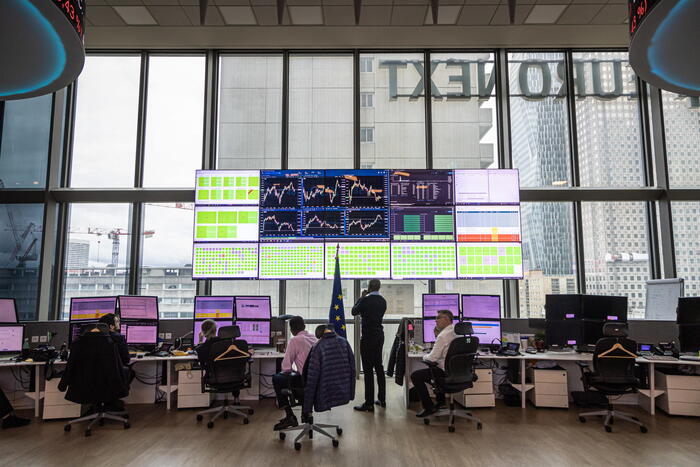European price lists are experiencing a turbulent time due to political uncertainty in France, a significant player in the eurozone economy. This turbulence is largely due to the announcement of early legislative elections following the vote for the renewal of the EU Parliament. The primary indices are showing mixed performances, with Milan suffering the most at -2.8%, followed by Paris at -2.2%. Conversely, Frankfurt and Madrid have seen smaller declines, just above 1%, while London remains relatively stable with a minor change of -0.04%.
In the US, futures are negative as markets await the University of Michigan indices on consumer confidence and inflation expectations, alongside the Federal Reserve's upcoming monetary policy report. The spread between Italian and German 10-year bonds has widened, reaching 158.7 points, its highest since February. Italian annual yields have risen by 1.2 points to 3.94%, whereas German and French yields have fallen. The dollar has strengthened against both the euro and the pound, and gold prices have slightly rebounded to $2,330.62 per ounce.
The banking and luxury sectors are particularly under pressure. Rising BTP yields are negatively impacting the value of securities in portfolios, causing declines in stock prices of major banks such as Mps (-6.24%), Unicredit (-5.88%), Commerzbank (-5.6%), SocGen (-5.4%), and Credit Agricole (-4.76%). The luxury goods sector is also facing difficulties, with Burberry, Kering, Hermes, and LVMH all experiencing notable drops. The automotive sector is not spared either, with Stellantis, Renault, Porsche, and Ferrari all recording losses.
Paris Stock Exchange fell significantly by 1.99% amidst political uncertainties in France. The CAC 40 index, a key player in Europe, dropped 156.68 points, marking its lowest since mid-February. This follows a brief respite the day before, driven by eased inflation in the United States. The announcement of the dissolution of the National Assembly has created a highly uncertain political climate. Portfolio manager Yann Azuelos points out that the sharp declines are a result of 'sale by basket' operations triggered by automated trading systems that hit technical thresholds, leading to consecutive sales.
The bond market is also under stress, especially French government bonds, whose interest rates for ten-year durations have increased. The gap between French and German bond rates is widening, with the former reaching 3.16% compared to the latter’s slight decrease. This gap, now at 0.69 percentage points, is the largest since 2017. According to Éric Bertrand of Ofi Invest, the current gap is not yet a reason for panic. On a brighter note, the US has reported a slowdown in inflation, with wholesale prices unexpectedly declining in May, which has somewhat validated the scenario of decreasing inflation.
In the broader European market, the automotive sector was particularly hit hard on Thursday following Brussels’ announcement of additional tariffs, up to 38%, on Chinese electric vehicle imports. This development saw significant drops for companies like Renault (-2.26%), Stellantis (-2.69%), and others. Concerns over potential retaliatory measures from China also weighed on markets, impacting the spirits sector, notably Rémy Cointreau and Pernod Ricard.
- The luxury sector's downward trend indicates potential concerns over consumer spending amidst economic uncertainty. Companies like Burberry, Kering, Hermes, and LVMH, which typically target high-end consumers, may need to adapt their strategies.
- Political developments in France could have far-reaching effects on European markets, particularly if the far-right National Rally party gains significant influence. Investors are closely monitoring the situation as it unfolds.
- The surprising resilience of the US markets, despite negative futures and mixed economic signals, could be indicative of underlying strengths in the American economy or misplaced investor confidence.
- The potential for increased tariffs and subsequent retaliatory measures highlights the complexities of international trade in an interconnected global economy, particularly affecting sectors heavily reliant on exports and imports.






